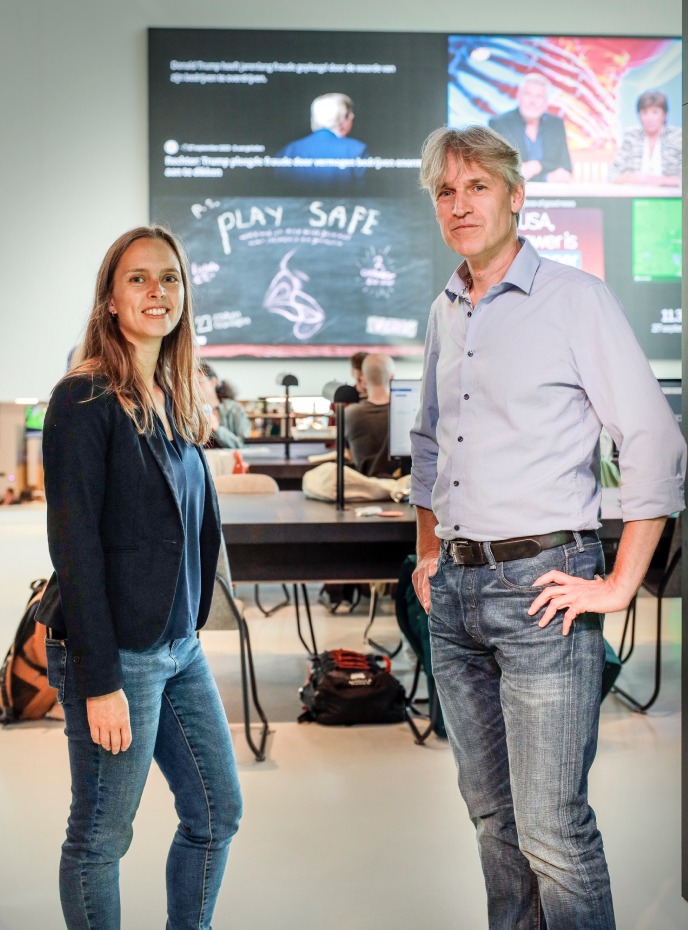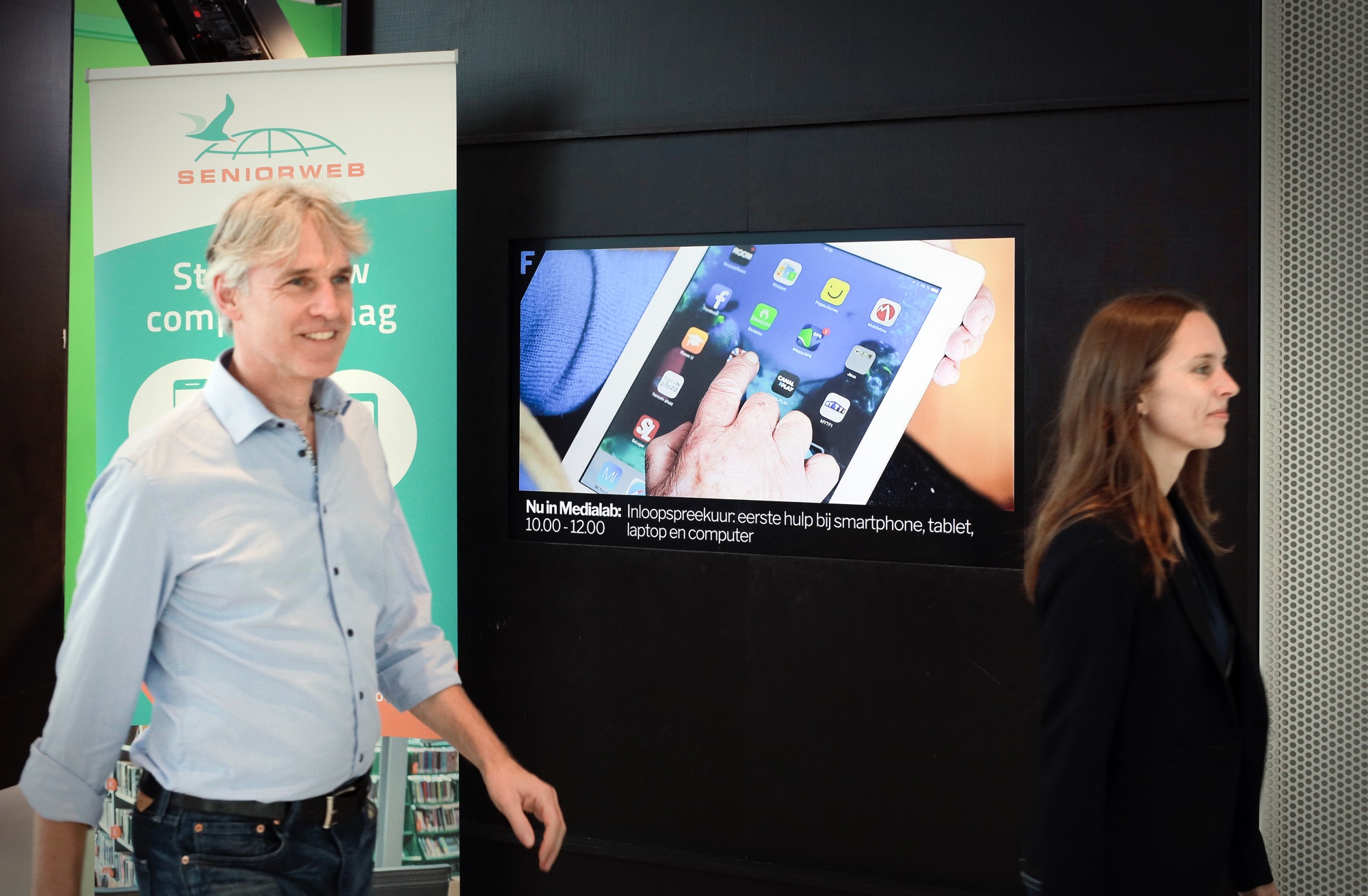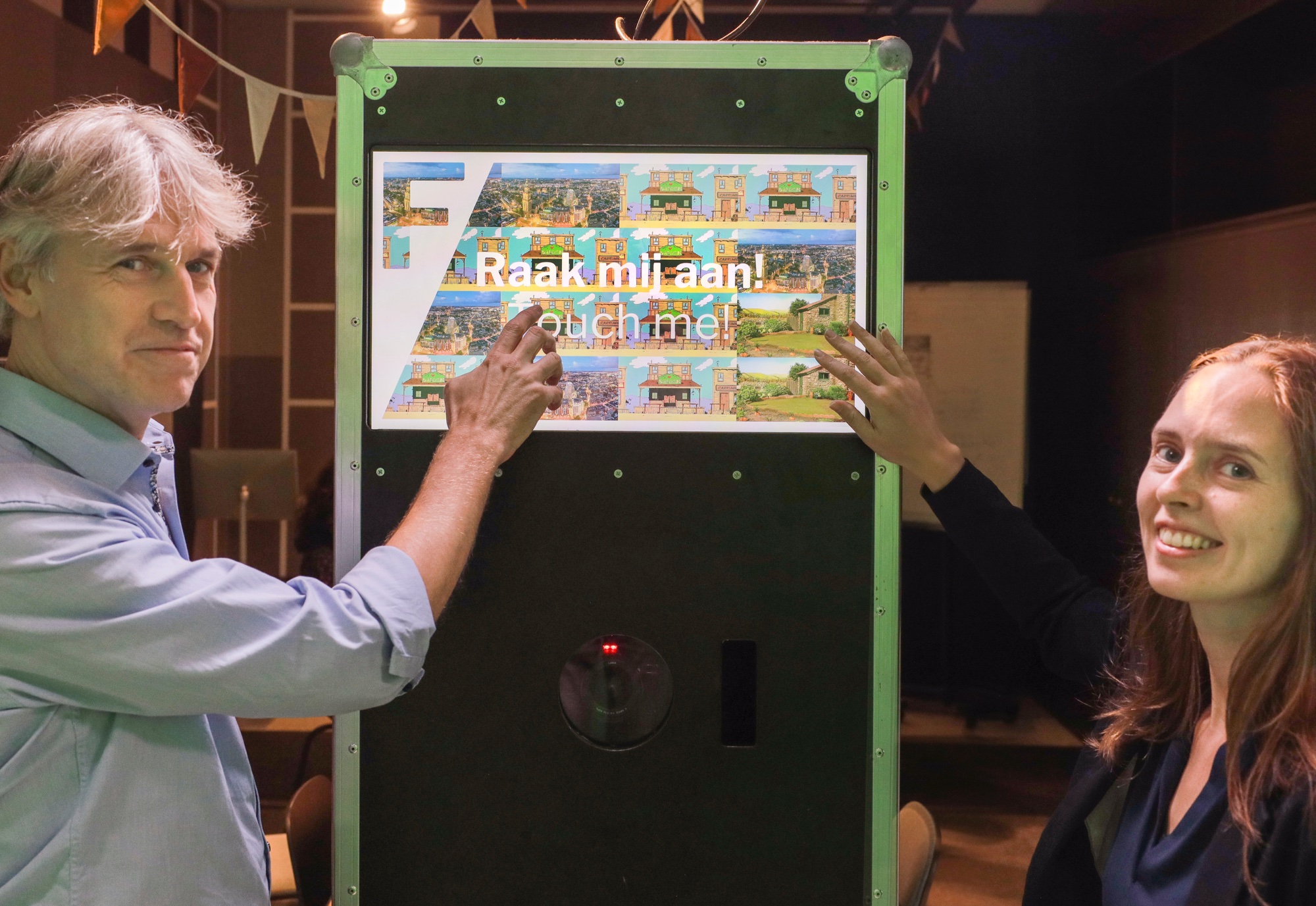No more DigiD frustrations
Our society is becoming more and more digitized. We apply for jobs online, follow classes online, meet each other on social media, and manage our affairs using a range of apps. What happens, though, if you don’t have a computer or don’t understand how DigiD works? You tend to slip through the cracks, which can have disastrous consequences. Marcel Broersma, Professor of Media and Journalistic Culture, and Joëlle Swart, assistant professor of Journalism Studies at the University of Groningen, are conducting research on the topic of digital literacy and inclusion. Their aim: to make our digital society more accessible to those who are digitally challenged.
By Theone Joostensz / Photos by Henk Veenstra

Digital literacy entails all knowledge and skills someone needs to survive and continue to develop themselves within a digital society. This ranges from knowing how to use computer programmes to being critical about the things you read or see online. In the Netherlands, about 2.5 to 5 million people are digitally illiterate. ‘That means a large part of the population is seriously struggling to keep up with our society while it becomes increasingly digitized,’ says Broersma. ‘This forces them to the margins of society, which is a concerning development.’
‘And this is not only true for elderly people, people with low literacy levels, and people with a migration background,’ says Swart. ‘Although, relatively speaking, these groups tend to have lower levels of digital literacy. It also applies to young people who have grown up with smartphones and iPads – they are not necessarily digitally literate. They might not have acquired the critical skills needed to properly evaluate information they find online, for example.’
Schools, libraries, and after-school care
Broersma and Swart have been researching digital literacy and inclusion for a few years now. They do so alongside the Digital Literacy Coalition an initiative set up by the University of Groningen consisting of 20 partners from the Northern Netherlands, whose goal is to make Groningen the most digitally literate city and province of the Netherlands by 2025. The researchers are trying to gain insight into questions such as: how are people taught to use digital technology? In what way are they applying this knowledge and these skills in their daily lives? What problems do people run into and can we take away these obstacles through policy changes?
'A large part of the population is seriously struggling to keep up with our society while it becomes increasingly digitized. That is a concerning development.'
‘Along with societal partners such as libraries and schools, we carry out projects that have a direct and positive impact on people, while they also provide us with fundamental scientific knowledge,’ Broersma explains. Their collaboration with partner organizations is vital, as they already have a natural access to the target group. ‘That's how we’re able to research digital literacy among eight to twelve-year-olds,’ Swart adds. ‘Together with after-school care organizations that are part of the childcare foundation Stichting Kinderopvang Stad Groningen (SKSG), we are looking into how we can best support children in learning how to use digital media.’
Another example of such a collaboration is the research they conduct at libraries. ‘Since 2020, libraries have a Digital Government Information Point (IDO, Informatiepunt Digitale Overheid) people can go to if they are struggling with anything related to the digital government,’ Swart says. ‘We’ve been looking at what kind of questions people ask, what’s being done to help them, and whether or not the problem was solved afterwards. It turns out that a lot of people come to the library with pretty complex questions. Questions not just about the digital government, but much broader as well, for example about how to install a certain app or how to maintain social contacts online. The information point fulfils a great need, and the questions are of a broader nature than we had anticipated.’

Struggling with DigiD
Citizens’ experiences and perspectives are at the heart of all their research studies. ‘One thing that causes instant frustration is DigiD,’ says Broersma. ‘It’s a great tool if you know how it works; you can claim your health expenses, file your tax returns, and apply for allowances – all in one place. Yet, if you don’t know how to request and use your DigiD, you’re automatically excluded from a lot of services. Citizens themselves as well as the people trying to support them run into this issue.’
For policy makers, who are themselves not part of the target group, the DigiD app is perfectly simple. Broersma: ‘They find it hard to imagine why someone wouldn’t be able to use the app. Our research shows where the difficulties lie in systems like this and what the social consequences could be. After all, you could ask yourself whether people can fully participate in society if they are unable to use these systems. If you’re excluded from all kinds of government services, where does that leave you in terms of citizenship?’
Self-sufficiency is freeing
How will their research change people’s lives practically speaking? Broersma: ‘At the individual level, we can see that people are much more self-sufficient. To give you an example: employees at a social workplace previously didn’t know how to register their days off in an app, which was a huge problem. By now, they’ve learned how to do it and it’s clear that this digital self-sufficiency is incredibly freeing on many levels, including the social and financial level.
Their research also contributes to change on a broader level: by properly evaluating the results their projects yield and by sharing and safeguarding any acquired knowledge, other initiatives can effectively build on their work without having to start from scratch every time. Broersma: ‘What we can see now is that there are all these initiatives throughout the country that rely on project funding. That means that when the money runs out, the project is cancelled, and that's it. With our research, we try to prevent this from happening by bringing our acquired knowledge to subsequent projects, which can then grow more quickly and issues can be solved at the system level.’

No magical cure-all for healthcare
Their research serves two purposes, says Broersma: ‘First of all, it’s a big societal challenge. Digital illiteracy and exclusion is a widespread societal problem that affects all areas of our society. Take our healthcare, for example, for which we are currently developing a large-scale project. The demand for care is increasing, while at the same time the number of people working in healthcare is decreasing. Digitization is considered the number one solution to this problem, but this is far too optimistic, as there’s still a lot of work to be done, both on the side of the patient and the side of the care provider. It’s our duty as scientists to bring such problems to light and to, hopefully, help solve them too. In addition, we’re serving a scientific interest: to us, this is also just an incredibly interesting field of research that we get to contribute to. There’s so much left to do and to achieve.’
More information
More news
-
19 January 2026
Digitization can leave disadvantaged citizens in the lurch
-
13 January 2026
Doing good in complex situations
